- Flemish Parliament
-
Flemish Parliament
Vlaams ParlementType Type Unicameral Leadership Speaker Jan Peumans, N-VA
since July 13, 2009First Deputy
SpeakerCarl Decaluwe, CD&V
since July 13, 2009Second Deputy
SpeakerMarijke Dillen, VB
since July 13, 2009Third Deputy
SpeakerDirk Van Mechelen, Open VLD
since July 13, 2009Fourth Deputy
SpeakerMia de Vits, SP.a
since July 13, 2009Fifth Deputy
SpeakerJos De Meyer, CD&V
since July 13, 2009Members 124
118 from the Flemish Region
6 from the Brussels RegionElections Last election June 7, 2009 Meeting place 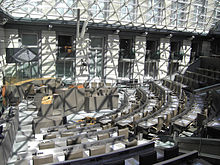
Koepelzaal, Flemish Parliament building, Brussels Website http://www.vlaamsparlement.be/ Belgium 
This article is part of the series:
Politics and government of
BelgiumFederal JudiciarySubdivisionsRelated subjects
The Flemish Parliament (Dutch:
 Vlaams Parlement (help·info), and formerly called Flemish Council or Vlaamse Raad) constitutes the legislative power in Flanders, for matters which fall within the competence of Flanders, both as a geographic region and a cultural community of Belgium (unlike the French-speaking community and Wallonia, which each have separate legislatures - the PCF and the Walloon Parliament).
Vlaams Parlement (help·info), and formerly called Flemish Council or Vlaamse Raad) constitutes the legislative power in Flanders, for matters which fall within the competence of Flanders, both as a geographic region and a cultural community of Belgium (unlike the French-speaking community and Wallonia, which each have separate legislatures - the PCF and the Walloon Parliament).The Flemish Parliament approves decrees, which are Flemish laws, applicable to all persons in the Flemish Region, and to Flemish institutions in Brussels, it appoints and supervises the Flemish Government, and approves the Flemish budget. The Flemish Parliament meets in the Flemish Parliament building in central Brussels, its members and staff are housed in the House of the Flemish Representatives.
Contents
History
From 1830 until 1970 Belgium was a unitary state with a single two chamber parliament and a single government. The laws issued by Parliament applied to all Belgians, and government ministers exercised their authority across the length and breadth of the country. Between 1970 and 2001 the Belgian Parliament approved five successive constitutional reforms. Slowly they changed Belgium from a unitary into a federal state. Part of this was to give the communities and later the regions their own parliamentary assemblee.
On December 7, 1971, the Cultural Council for the Dutch-speaking Cultural Community held its first meeting, later followed a parliament for the Flemish Region. Flanders decided as early as 1980 to merge the Flemish Community with the Flemish Region. As a result, Flanders now has a single parliament and a single government with competence over community as well as over regional matters. This Parliament was called the Vlaamse Raad until it was officially renamed Vlaams Parlement (Flemish Parliament) on June 13, 1995. Over the last thirty years, Flanders has thus developed into a separate state within the federalised Belgium.
Members are called "Vlaams Volksvertegenwoordiger". In English, they will be referred to as "Members of the Flemish Parliament" (MFP's), like the MSP's in Scotland and the MEP's in the European Union. The title "Flemish Representative" is also used in English. Since 1995 members of the Flemish Parliament are directly elected.
Currently, many voices in the Flemish Movement would like the Flemish Parliament to acquire certain sovereign powers in addition to those concerning language, culture and education. Furthermore, among the broader Flemish population a consensus has emerged that the Flemish Parliament should also acquire much larger financial and fiscal autonomy.
Competencies
Competencies for the entire Flemish Community
- Culture: The Flemish parliament is competent for all cultural matters. This includes protection of the cultural heritage (e.g. literature, fine arts), tourism and the media. A current debate is about the status of the official Flemish Radio & television, the VRT.
- Language use: including language use in schools and universities, in the Flemish and local administrations, and in relations between employers and employees in the Dutch-speaking part of Belgium, with exception of the 'language facilities' enjoyed in some municipalities.
- All ‘matters relating to the person’: youth protection, family policy and childcare, together with policy regarding the handicapped, old age pensioners, equal opportunities and the integration of migrants.
- Education: from kindergarten to university incl. scholarships, though the establishment of the period of compulsory education, requirements for awarding degrees, and pension schemes for teachers remain at the federal level.
- Health care: including preventive health care, home care, institutions for mental health care, but excluding health insurance, financing of hospitals and most other competencies that remained federal.
Competencies for the Flemish Region only
- Economy, employment and energy policy: includes government support for business, employment policy, agriculture and fisheries, the distribution of electricity and natural gas, the exploitation of new energy sources and the promotion of responsible use of energy
- Town and country planning, housing, land development & nature conservation: including regional planning, building permits, housing policy, social housing, urban renewal, preservation of monuments and natural sites, land consolidation and nature conservation
- Environment and water policy: including the reduction of air, land and water pollution, noise control, the purification of waste water, the production and distribution of drinking water and waste disposal policy
- Scientific research: this field is the full responsibility of the regional authorities, except for aerospace and military research (that remained federal).
- Public works and transport: includes roads, the Port of Antwerp, the Port of Bruges-Zeebrugge, the Port of Ghent and the Port of Ostend, the regional airports of Deurne and Ostend (Antwerp International Airport and Ostend-Bruges International Airport, and urban and regional transport.
- Agriculture: includes the Agricultural Investment Fund, the agricultural education, the development of rural regions, the sale of agricultural and horticultural products and the fisheries policy. By the stipulations of the Lambermont Agreement (2001), the regions are competent for almost the complete agricultural policy but a few security aspects like food security and animal welfare which remained under the competence of the federal government.
- Municipalities, provinces and interurban organisations: includes the allocating of financial resources to the 308 Flemish municipalities and to the Flemish provinces, and administrative supervision of these communes and provinces and their laws.
International affairs
For all areas within its sphere of competence (both vis-à-vis community or regional competences), the Flemish state can conclude international treaties with other states, whether they are national states or member states of a federation. This competence includes development cooperation and foreign trade.
Members of the Flemish Parliament
118 members are directly elected in the Flemish Region. They have voting rights for both regional and community competencies. 6 members are directly elected in the Brussels-Capital Region by those voters who voted for a Dutch-speaking party in the Brussels regional elections. They have no voting rights for the regional competencies.
This table shows the distribution of seats following the 2009 regional election:Affiliation Constituency Total Ant. E-Fl. Fl-Br. Lim. W-Fl. Bru. Christian Democratic and Flemish 8 6 4 5 7 1 31 Open Flemish Liberals and Democrats 4 6 4 2 3 2 21 Flemish Interest 7 4 3 3 3 1 21* Socialist Party Different 5 4 3 3 3 1 19 New Flemish Alliance 6 3 3 2 2 0 16* List Dedecker 1 2 1 1 3 0 8 Green! 2 2 1 0 1 1 7 Union of Francophones — — 1 — — — 1 Total 33 27 20 16 22 6 124 - On 31 Augustus 2011, Karim Van Overmeire left the Flemish Interest and joined the N-VA, decreasing the number of seats held by the former party to 20 and increasing the seats of the latter to 17.
Seat division
2009-2014 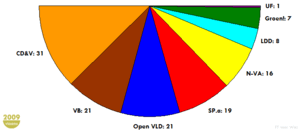
2004-2009 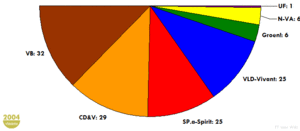
1999-2004 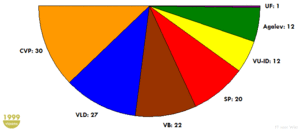
1995-1999 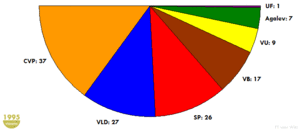
Officers
At the beginning of each parliamentary year, on the fourth Monday in September, the Flemish Parliament elects its Speaker. The Speaker chairs the plenary sessions of the Flemish Parliament and acts as its official representative. He or she determines whether a certain initiative is admissible and thus can be put to parliament at all. The Flemish Ministers take the oath before the Speaker of the Flemish Parliament. Only the head of the Flemish government, the Flemish Minister-President, takes the oath before the King.
The current Speaker of the Flemish Parliament is Jan Peumans of the New Flemish Alliance (N-VA).
The Speaker of the Flemish Parliament is assisted by the Bureau, which consists of the Speaker, four Deputy Speakers and three Secretaries. The Bureau is responsible for the day-to-day activities of the Flemish Parliament and meets at least once every two weeks. The Extended Bureau, which consists of the Bureau and the floor leaders of the recognised political fractions in the Flemish Parliament coordinates the political activities of the Flemish Parliament and sets the agenda for the plenary session. It usually meets every week on Monday.
Committees
Much of the work of the Flemish Parliament is done in committee. The Flemish Parliament currently has eleven standing committees. Each committee is specialised in a particular subject area and consists of 15 Members of the Flemish Parliament. The primary task of the committees is to examine the texts of decree proposals and organise hearings and discussions on decree proposals. There are also two ad hoc committees: the Digital Flanders Committee and the Flemish Constitution Committee.
List of standing committees
- Committee for General Affairs and Financial and Budgetary Matters
- Subcommittee on Finance and Budget
- Committee for Brussels and its Flemish Suburbs
- Committee for Administrative Affairs, Institutional and Administrative Reform and Decree Evaluation
- Committee for Housing, Urban Policy, Integration and EqualOpportunities
- Committee for Foreign Policy, European Affairs, International Co-operation and Tourism
- Committee for Education, Training, Science and Innovation
- Committee for Culture, Youth, Sports and Media
- Committee for Public Well-Being, Public Health and Family Affairs
- Committee for Economic Affairs, Employment and Social Economics
- Subcommittee on Arms Trade
- Committee for Environmental and Nature Conservation Issues, Agriculture, Fishery and Rural Development Policy and Town and CountryPlanning and Real Estate
- Subcommittee on Agriculture, Fishery and Rural Policy
- Committee for Public Works, Mobility and Energy
See also
- Flemish Community Commission
- Belgian regional elections, 2004
- Brussels Parliament
- Walloon Parliament
- Politics of Flanders
- Flemish Council for Science Policy (VRWB)
- Flemish Institute for Scientific and Technological Aspect research (viWTA)
External links
Coordinates: 50°50′51″N 4°22′03″E / 50.8475°N 4.3675°E
Territories Modern Belgium: Flemish Region • Flemish Community
Neighbouring and historical: County of Flanders (862–1795) • French Flanders • Zeelandic Flanders • Romance Flanders
Local regions: Flemish Ardennes • Campine • Hageland • Haspengouw • Pajottenland • Meetjesland • Westhoek • Waasland • ...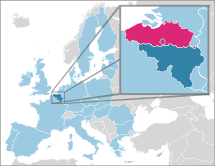
Provinces and cities West Flanders (Bruges) • East Flanders (Ghent) • Antwerp (Antwerp) • Flemish Brabant (Leuven) • Limburg (Hasselt)
See also: Brussels • list of municipalities • Flemish DiamondPolitics History and symbols Flag • Coat of arms • De Vlaamse Leeuw (anthem) • De Leeuw van Vlaanderen (epic) • Day of the Flemish Community (Guldensporenslag)Other Governments of Belgium Federal Belgium Government (Prime Ministers) — Parliament consisting of the Chamber of Representatives (representatives) and Senate (senators)
Brussels-Capital Region Flemish Region and Community
(merged institutions)Walloon Region French Community German-speaking Community See also: Politics of Belgium · Political parties in Belgium · Elections in Belgium Categories:- Flanders
- Flemish Parliament
- Unicameral legislatures
Wikimedia Foundation. 2010.
